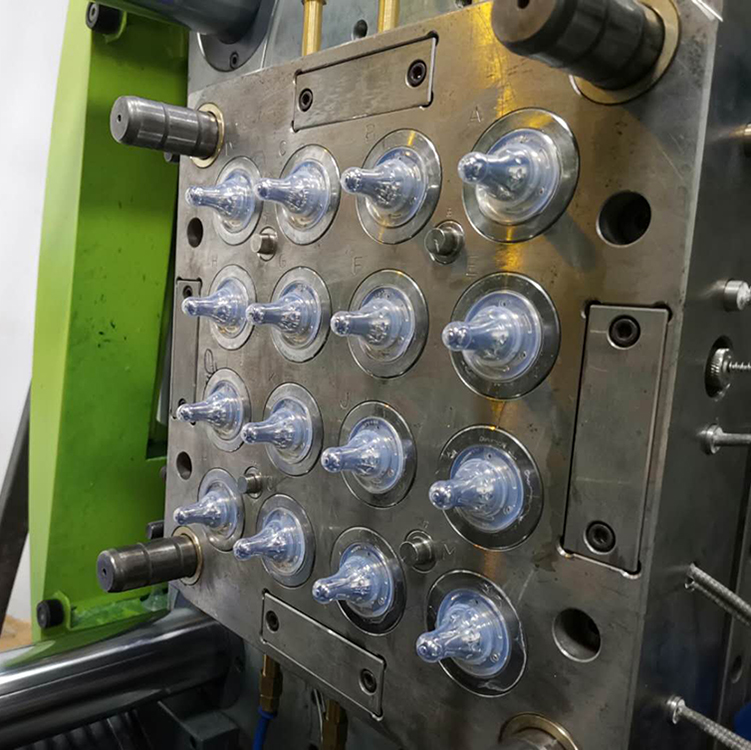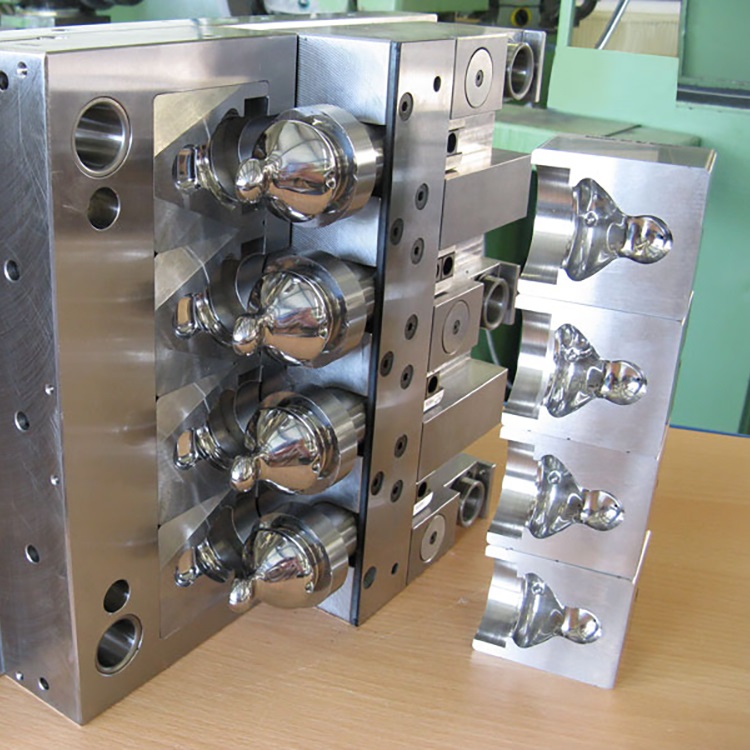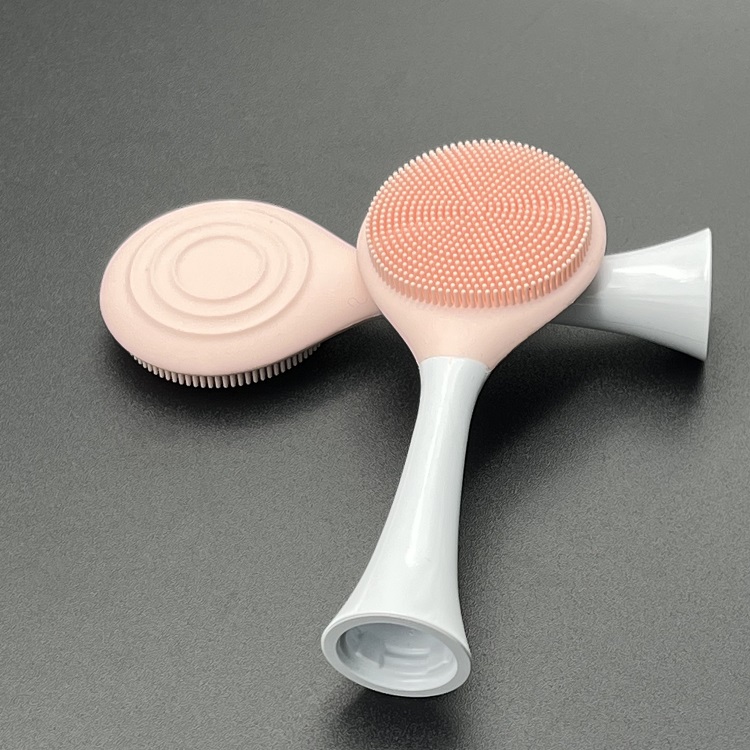Liquid silicone rubber (LSR) has been a revolutionary material in the manufacturing industry since its inception in the late 1970s. Its versatile properties and wide range of applications have made it the material of choice for producing high-quality silicone parts and products. The unique characteristics of liquid silicone rubber injection molding set it apart from high-consistency rubber (HCR) molding and thermoplastic injection molding methods.
What Is LSR?
LSR stands for Liquid Silicone Rubber. It is a specialized type of silicone material that is in a liquid state before being cured or solidified. LSR is composed of a base silicone polymer along with catalysts, cross-linking agents, and various fillers or additives. LSR offers several advantages over traditional solid silicone rubber, such as improved flowability, shorter curing times, and the ability to produce complex shapes with high precision.
The versatile properties of LSR, derived from its unique siloxane bond, play a vital role in meeting the requirements of rigorous applications. The inorganic backbone provided by the siloxane bond ensures that LSR does not interact with biological materials, making it compatible for use in various medical and healthcare applications. Additionally, the incorporation of organic chemical groups further enhances LSR’s potential for compatibility and performance in demanding environments. Moreover, the siloxane bond in LSR contributes to its excellent mechanical performance and strength, enabling it to withstand mechanical stresses and strains without compromising its integrity. This makes LSR well-suited for applications that require durable materials, such as automotive components, electrical connectors, and seals.
The liquid nature of LSR allows it to be efficiently injected into molds using a specialized injection molding process. This process involves heating the LSR material and injecting it into a custom-designed mold, where it takes the shape of the mold cavity. Once cooled and solidified, the LSR part can be ejected from the mold, resulting in a finished product with exceptional detail and dimensional accuracy. The characteristics of LSR highlight its exceptional versatility, reliability, and performance, making it a preferred choice for manufacturers in various industries seeking high-quality silicone parts and products.
When combined with the advantages of injection molding, LSR proves even more advantageous. The injection molding process allows for efficient and precise replication of complex shapes and intricate designs, facilitating high-volume production with consistent part quality. This level of consistency ensures that LSR parts meet stringent specifications and performance requirements, contributing to improved productivity and overall manufacturing efficiency.
Properties of LSR
LSR offers numerous beneficial properties, including excellent thermal stability, chemical resistance, high tear strength, and biocompatibility. It can withstand extreme temperatures, from -50°C to 250°C, without deforming or losing its mechanical properties. This makes LSR suitable for demanding applications where reliability, durability, and performance are critical. Here are more detailed properties of Liquid Silicone Rubber (LSR):
- High Thermal Stability:
LSR exhibits excellent resistance to extreme temperatures, making it suitable for applications that involve both high and low temperature environments. It can withstand temperatures ranging from -50°C to 250°C without significant changes in its physical properties. This thermal stability ensures that LSR products maintain their integrity and performance even under challenging conditions.
- Excellent Flexibility and Elasticity:
LSR possesses inherent flexibility and elasticity, allowing it to be easily bent, stretched, or compressed without experiencing permanent deformation. This property makes it ideal for applications that require components to endure repeated movements, vibrations, or stress, such as seals, gaskets, and flexible connectors.
- Superior Chemical Resistance:
LSR is highly resistant to a broad range of chemicals, including solvents, oils, acids, and cleaning agents. It maintains its integrity and mechanical properties when exposed to harsh chemical environments, making it suitable for use in industries where chemical compatibility is crucial, such as pharmaceuticals, automotive, and electronics.
- Low Compression Set:
Compression set refers to the ability of a material to regain its original shape after being subjected to compression or deformation over time. LSR has a low compression set, meaning it can maintain its shape and elasticity even after prolonged compression, ensuring long-term performance and sealing effectiveness.
- Biocompatibility:
LSR is widely used in the healthcare industry due to its excellent biocompatibility. It is non-toxic, hypoallergenic, and does not cause adverse reactions when in contact with human tissues or bodily fluids. This biocompatibility makes LSR suitable for medical implants, wearable devices, and other healthcare applications.
- UV and Weather Resistance:
LSR exhibits excellent resistance to ultraviolet (UV) radiation and weathering effects. It does not degrade or discolor when exposed to sunlight or outdoor environments, making it suitable for outdoor applications where prolonged UV exposure is expected.
- Excellent Electrical Insulation Properties:
LSR has high electrical resistance, making it an effective insulator. It can withstand high voltages and provide electrical insulation in applications such as electrical connectors, cables, and insulating components.
- Tear Strength and Abrasion Resistance:
LSR possesses high tear strength, which means it can resist the propagation of tears or cracks when subjected to mechanical stress or sharp edges. It also exhibits good abrasion resistance, making it capable of withstanding wear and friction over time.
The versatility and superior properties of LSR have made it a go-to choice for manufacturers seeking to produce high-quality silicone parts and products. Its wide range of benefits, combined with its ability to meet stringent industry standards, has solidified its position as an essential material in the modern manufacturing landscape.
Manufacturing Process of LSR Molding
The manufacturing process of liquid silicone rubber (LSR) injection molding involves several key steps that deliver exceptional precision and quality in the production of LSR components. This process harnesses the unique properties of LSR and leverages advanced technology to create a wide range of products for diverse industries. Here’s a more detailed breakdown of each step in the manufacturing process of LSR injection molding:

Step 1. Material Preparation:
– LSR materials, consisting of a base material and a curing agent, are precisely measured and mixed according to the specific formulation requirements.
– The mixture is thoroughly homogenized to ensure a consistent blend of the LSR components.
– The mixture is then degassed to remove any entrapped air or bubbles, ensuring the material’s integrity and performance.
Step 2. Mold Preparation:
– The mold, made from high-quality metals like aluminum or steel, is designed and fabricated to accommodate the desired shape and features of the LSR component.
– The mold is precisely machined to ensure accuracy and repeatability.
– Release agents or coatings are applied to the mold to facilitate easy demolding of the LSR parts.
Step 3. Injection:
– The LSR injection molding machine utilizes a screw or plunger system to accurately meter and deliver the LSR material.
– The machine maintains predetermined temperature and pressure conditions during the injection process.
– The LSR material is injected into the mold cavity at a controlled speed and pressure to fill it completely, ensuring that no air is trapped.
Step 4. Curing:
– The mold, with the injected LSR material, undergoes the curing process to initiate the crosslinking reaction within the material.
– Curing can take place in an oven or heated mold, where specific temperature and time parameters are carefully controlled.
– The curing process ensures that the LSR material permanently solidifies and acquires the desired mechanical properties.
Step 5. Demolding:
– After the curing process, the mold is cooled to allow the LSR material to solidify and take its final form.
– The demolding process involves carefully opening the mold and removing the solidified LSR parts.
– Proper demolding techniques are employed to prevent any damage to the delicate LSR parts and to ensure their dimensional accuracy and surface finish.
Step 6. Finishing and Quality Control:
– The manufactured LSR parts may undergo additional finishing processes, such as trimming excess material, degating any remaining sprues or runners, or applying surface treatments like polishing or texturing.
– Stringent quality control measures are implemented throughout the manufacturing process.
– Inspections, measurements, and testing of the LSR parts are conducted to verify dimensional accuracy, mechanical properties, visual appearance, and adherence to quality standards.
By following these detailed steps, manufacturers can achieve precise and reliable production of LSR components through injection molding. The attention to material preparation, mold design, injection parameters, curing conditions, demolding techniques, and quality control ensures the creation of high-quality LSR parts with consistent properties and excellent performance.
Benefits of LSR Injection Molding
LSR injection molding offers a host of benefits that make it a preferred manufacturing method for producing a wide range of components and products. Here are some key advantages of LSR injection molding:
- Design Flexibility:
LSR injection molding allows for the production of complex and intricate designs with high precision. The liquid nature of LSR enables it to flow easily into intricate mold cavities, ensuring the replication of fine details and features. This design flexibility enables the creation of customized and unique LSR components to meet specific application requirements.
- Excellent Material Properties:
LSR exhibits exceptional material properties that contribute to its popularity. It offers a wide temperature range, excellent chemical resistance, high tear strength, low compression set, and superior elasticity. These properties make LSR suitable for demanding applications in industries such as automotive, healthcare, electronics, and consumer goods.
- Consistent Part Quality:
LSR injection molding delivers consistent and high-quality parts throughout the production process. Each injection cycle produces identical parts with minimal variation, thanks to the precise control of LSR material distribution, temperature, and injection pressure. Consistency in part quality ensures reliability, reduces rejection rates, and enhances overall manufacturing efficiency.
- Cost-Effective Production:
LSR injection molding can provide cost advantages in high-volume production. The ability to efficiently produce large quantities of LSR parts, combined with reduced labor costs and shorter cycle times, contributes to lower overall production costs. Additionally, the long lifespan and durability of LSR parts minimize the need for frequent replacements or repairs, resulting in cost savings over time.
- Enhanced Productivity:
LSR injection molding offers enhanced productivity due to its high-speed production capabilities and automated processes. The efficient injection molding machines, coupled with advanced robotics and automation systems, enable streamlined production and faster cycle times. This increased productivity translates into higher output, reduced lead times, and improved overall operational efficiency.
- Compatibility with Overmolding:
LSR is often used in overmolding applications, where it is molded onto or around another substrate material. This enables the creation of multi-component parts, combining the unique properties of LSR with the benefits of other materials, such as rigid plastics or metals. Overmolding expands design possibilities and enhances product functionality while maintaining a strong bond between materials.
- Reduced Waste:
LSR injection molding minimizes material waste and scrap. The precise control over the injection process ensures that the exact amount of LSR material required is used, reducing excess material and associated costs. Furthermore, any generated scrap can often be recycled or reused, contributing to a more sustainable manufacturing process.
- Regulatory Compliance:
LSR materials used in injection molding often meet strict regulatory requirements, making them suitable for critical applications in industries like healthcare and medical devices. LSR is biocompatible, hypoallergenic, and resistant to bacteria or fungal growth, making it a preferred choice for medical and food-contact applications.
In summary, the combination of the advantages previously discussed, along with the high-volume production capability, low chance of contamination, quick cycle time, elimination of flash and waste, and enhanced safety, consolidates LSR injection molding’s position as a preferred manufacturing method. These benefits make it versatile, efficient, and cost-effective for a wide range of industries seeking high-quality components in large quantities while ensuring stringent hygiene standards and worker safety.
Industries and Applications of LSR Products
Liquid Silicone Rubber (LSR) products find a wide variety of applications across different industries due to their unique properties and versatility. Here are some examples of the diverse applications of LSR products:
- Medical and Healthcare:
LSR is extensively used in the medical and healthcare field due to its biocompatibility, hypoallergenic nature, and resistance to bacteria or fungal growth. LSR products such as medical-grade seals, gaskets, valves, surgical instruments, respiratory masks, and catheters are crucial for ensuring safe and reliable healthcare delivery. LSR’s flexibility allows for the creation of custom-fit and comfortable medical devices.
- Automotive:
LSR products are widely employed in the automotive industry for their exceptional temperature resistance, high durability, and reliability. LSR is used for manufacturing automotive seals, gaskets, connectors, vibration dampeners, electrical components, and automotive lighting. Its resistance to harsh chemicals and extreme temperatures makes LSR suitable for under-the-hood applications as well.
- Electronics and Electrical Industry:
Due to its excellent electrical insulation properties, LSR is extensively used in the electronics and electrical industry. LSR products are utilized in the manufacturing of connectors, seals, gaskets, keypads, and cable assemblies. LSR’s ability to withstand a wide temperature range, flame resistance, and its resistance to UV radiation make it well-suited for demanding electronic applications.
- Consumer Goods:
LSR products play a significant role in various consumer goods applications. LSR’s tactile feel, durability, and ease of customization make it ideal for producing consumer goods such as smartphone covers, kitchen utensils, baby products, personal care items, sportswear accessories, and household appliances. LSR’s resistance to staining, aging, and UV radiation ensures long-lasting performance and appearance.
- Aerospace:
The aerospace industry benefits from LSR’s flame resistance, low outgassing, and ability to withstand extreme temperature variations. LSR is extensively used for manufacturing gaskets, seals, O-rings, and electrical components in aerospace applications. Its reliability and durability contribute to the safety and performance of aerospace systems.
- Food and Beverage:
LSR products find applications in food and beverage industries due to their compliance with stringent food safety regulations. LSR’s non-toxic, odorless, and tasteless properties make it suitable for producing baby bottle nipples, food storage containers, kitchen utensils, and food-grade seals. LSR’s resistance to high temperatures and chemicals ensures its compatibility with various food processing and sterilization methods.
- Industrial Automation:
LSR products are utilized in industrial automation and machinery applications. LSR’s resilience, chemical resistance, and ability to operate under extreme conditions make it suitable for manufacturing industrial gaskets, seals, diaphragms, valves, and connectors. LSR’s high tear strength and low compression set allow for reliable and long-lasting performance in demanding industrial environments.
These are just a few examples of the wide-ranging applications of LSR products. The unique properties of LSR, such as biocompatibility, flexibility, durability, temperature resistance, and chemical resistance, make it a versatile material that fulfills diverse requirements across industries. The continual innovation and development of LSR formulations further expand its potential for future applications in emerging industries.

Custom LSR Molding Solutions from GEMS-MFG
GEMS-MFG stands as a true pioneer in the realm of LSR injection molding, earning its place among the leading silicone injection molding companies worldwide. With billions of liquid silicone rubber parts produced for diverse industries, we offer a comprehensive range of value-added services, spanning from prototyping to high-volume production, including LSR multi-shot and over-molded parts.
With over 20-year manufacturing experience, GEMS-MFG’s advanced LSR molding technology and unwavering commitment to quality enable us to provide exceptional solutions and consistent, reliable parts and services. We have gone beyond mere mold production, offering a variety of value-added secondary processes to enhance the final product.
If you require information regarding LSR and LSR injection molding, GEMS-MFG is the ideal partner. Our dedicated team is ready to discuss your specific product requirements and offer tailored solutions that cater to your needs.

